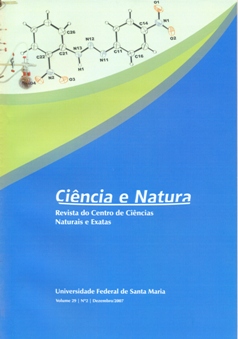Avaliação dos Critérios do Plano de Participação nos Lucros por Meio de Indicadores de Desempenho
DOI:
https://doi.org/10.5902/2179460X9829Resumo
O presente estudo concentra-se em uma pesquisa e avaliação doscritérios do plano de Participação nos Lucros ou Resultados - PLR - aplicadohá 7 anos na CERTHIL. Utilizou-se o método de análise descritiva emultivariada. O objetivo da pesquisa é propor uma metodologia que facilitea implantação e avaliação de futuros planos de participação nos lucrosem outras empresas. Aplicou-se um questionário valendo-se de uma escalaLikert aos gestores e colaboradores da CERTHIL e gestores daCERMISSÕES, que pretendem implantar a PLR. A análise descritiva foiútil para constatar o entendimento e opinião dos respondentes de ambas ascooperativas sobre a PLR, quanto a sua implantação, influência na qualidade,lucratividade, gestão administrativa, motivação, relacionamento e comprometimento.A avaliação dos indicadores, através da análise multivariada,possibilitou selecionar um grupo ideal de variáveis para análise. Com aAnálise Fatorial foi possível identificar o grau de importância de cada indicadoranalisado, facilitando o acompanhamento dos indicadores de maior emenor importância na composição do plano. A Análise de ComponentesPrincipais permitiu reduzir e identificar as variáveis de maior relevância estatística que mais expliquem os fatores a serem analisados e identifiquem asque devem manter um maior controle gerencial. A metodologia propostaconfirma sua importância na avaliação e implantação de planos de participação nos lucros e resultados nas empresas. Pode-se utilizar esse métodocomo ferramenta para monitorar indicadores de desempenho aplicados aPLR e contribuir na gestão administrativa.Downloads
Downloads
Publicado
Como Citar
Edição
Seção
Licença
Para acessar a DECLARAÇÃO DE ORIGINALIDADE E EXCLUSIVIDADE E CESSÃO DE DIREITOS AUTORAIS clique aqui.
Diretrizes Éticas para Publicação de Revistas
A revista Ciência e Natura está empenhada em garantir a ética na publicação e na qualidade dos artigos.
A conformidade com padrões de comportamento ético é, portanto, esperada de todas as partes envolvidas: Autores, Editores e Revisores.
Em particular,
Autores: Os Autores devem apresentar uma discussão objetiva sobre a importância do trabalho de pesquisa, bem como detalhes e referências suficientes para permitir que outros reproduzam as experiências. Declarações fraudulentas ou intencionalmente incorretas constituem comportamento antiético e são inaceitáveis. Artigos de Revisão também devem ser objetivos, abrangentes e relatos precisos do estado da arte. Os Autores devem assegurar que seu trabalho é uma obra totalmente original, e se o trabalho e / ou palavras de outros têm sido utilizadas, isso tem sido devidamente reconhecido. O plágio em todas as suas formas constitui um comportamento publicitário não ético e é inaceitável. Submeter o mesmo manuscrito a mais de um jornal simultaneamente constitui um comportamento publicitário não ético e é inaceitável. Os Autores não devem submeter artigos que descrevam essencialmente a mesma pesquisa a mais de uma revista. O Autor correspondente deve garantir que haja um consenso total de todos os Co-autores na aprovação da versão final do artigo e sua submissão para publicação.
Editores: Os Editores devem avaliar manuscritos exclusivamente com base no seu mérito acadêmico. Um Editor não deve usar informações não publicadas na própria pesquisa do Editor sem o consentimento expresso por escrito do Autor. Os Editores devem tomar medidas de resposta razoável quando tiverem sido apresentadas queixas éticas relativas a um manuscrito submetido ou publicado.
Revisores: Todos os manuscritos recebidos para revisão devem ser tratados como documentos confidenciais. As informações ou ideias privilegiadas obtidas através da análise por pares devem ser mantidas confidenciais e não utilizadas para vantagens pessoais. As revisões devem ser conduzidas objetivamente e as observações devem ser formuladas claramente com argumentos de apoio, de modo que os Autores possam usá-los para melhorar o artigo. Qualquer Revisor selecionado que se sinta desqualificado para rever a pesquisa relatada em um manuscrito ou sabe que sua rápida revisão será impossível deve notificar o Editor e desculpar-se do processo de revisão. Os Revisores não devem considerar manuscritos nos quais tenham conflitos de interesse resultantes de relacionamentos ou conexões competitivas, colaborativas ou outras conexões com qualquer dos autores, empresas ou instituições conectadas aos documentos.






